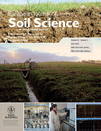
EUROPEAN JOURNAL OF SOIL SCIENCE
Scope & Guideline
Advancing Soil Knowledge for a Sustainable Future
Introduction
Aims and Scopes
- Soil Health and Functionality:
Research on the biological, chemical, and physical properties of soils that contribute to their health and functionality. This includes studies on soil organic matter, microbial communities, and nutrient cycling. - Soil Management Practices:
Investigations into various soil management strategies aimed at improving soil quality, enhancing productivity, and mitigating environmental impacts, such as carbon sequestration and nitrogen management. - Impact of Climate Change on Soils:
Studies exploring how climate change affects soil properties, processes, and functions, including impacts on soil moisture, temperature, and greenhouse gas emissions. - Soil-Plant Interactions:
Research focusing on the interactions between soils and plants, including nutrient uptake, root-soil dynamics, and the role of soil amendments in enhancing plant growth. - Soil Mapping and Modeling:
Development and application of innovative techniques for soil mapping, modeling soil processes, and predicting soil behavior under various management and environmental scenarios. - Soil Contamination and Remediation:
Studies addressing the contamination of soils with heavy metals, pesticides, and other pollutants, as well as strategies for soil remediation and restoration.
Trending and Emerging
- Sustainable Soil Management:
There is an increasing emphasis on sustainable practices that balance productivity with environmental protection, including studies on cover crops, reduced tillage, and organic amendments. - Soil Carbon Sequestration:
Research focused on strategies for enhancing soil carbon storage as a means to mitigate climate change is gaining traction, including studies on biochar, organic matter inputs, and management practices. - Microbial Ecology and Functionality:
Emerging studies on soil microbial communities and their roles in nutrient cycling, soil health, and ecosystem services are becoming more prominent, reflecting a growing interest in soil biology. - Soil-Climate Interactions:
Research exploring the interactions between soil processes and climate variables, particularly in the context of climate change impacts on soil health and function, is increasingly prevalent. - Innovative Soil Mapping Technologies:
The application of advanced technologies such as remote sensing, machine learning, and spectroscopy for soil mapping and analysis is on the rise, indicating a shift towards data-driven approaches. - Soil Contamination and Remediation Strategies:
With growing concerns about soil pollution, there is a trend towards research on contamination sources, impacts, and effective remediation techniques to restore soil health.
Declining or Waning
- Traditional Soil Fertility Studies:
Research focused on basic soil fertility parameters, such as pH and macronutrient levels, has decreased as more complex interactions and innovative management practices gain interest. - Soil Physics without Contextual Applications:
Papers solely focusing on theoretical aspects of soil physics without direct applications to agricultural or environmental contexts have become less common, as applied research gains prominence. - Historical Soil Studies:
Research concentrating solely on historical soil profiles or ancient soil use without contemporary relevance is declining, as the focus shifts to current challenges and sustainability.
Similar Journals

Biochar
Advancing Soil Health with Groundbreaking Biochar ResearchWelcome to Biochar, an esteemed academic journal dedicated to the exploration and advancement of biochar technology and its applications across multiple fields. Published by SPRINGER SINGAPORE PTE LTD, this journal serves as a vital platform for disseminating high-quality research that addresses the critical intersection of environmental science, soil health, and sustainable materials development. With a commendable Q1 ranking in the fields of Biomaterials, Environmental Science, Pollution, and Soil Science, Biochar is recognized for its significant impact, as evidenced by its placement in the upper percentiles across various Scopus rankings. Researchers and professionals in agricultural and biological sciences will find valuable insights and innovative methodologies that promote sustainable practices and enhance soil quality. This journal, operating from its base in Germany, is committed to fostering a collaborative environment where cutting-edge research can inform policy and practice. Engage with us as we strive to advance the science of biochar from 2019 to 2024 and beyond.

SOIL SCIENCE SOCIETY OF AMERICA JOURNAL
Unveiling the Secrets Beneath Our FeetWelcome to the SOIL SCIENCE SOCIETY OF AMERICA JOURNAL, a premier publication in the field of soil science, published by WILEY. With a distinguished history dating back to 1976, this journal has consistently provided a platform for researchers to share innovative findings and insights into soil’s critical role in agricultural and ecological systems. Featuring an impressive Q1 category ranking in Soil Science and positioned within the top 25% of its field according to Scopus, this journal is recognized for its impactful contributions to advancing our understanding of soil dynamics. While not an open-access journal, it remains a valuable resource for academics and professionals alike, with distinguished articles that meet the highest scientific standards. As it enters its converged years from 1976 to 2024, the journal aims to continue shaping the future of soil research, offering valuable knowledge to students, researchers, and practitioners dedicated to sustainable land management and environmental preservation.
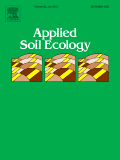
APPLIED SOIL ECOLOGY
Illuminating the Role of Soils in Ecosystem ServicesApplied Soil Ecology, published by Elsevier, is a premier journal dedicated to advancing the field of soil ecology through rigorous research and innovative methodologies. With an impressive impact factor and a consistent placement in the Q1 quartile across various categories including Agricultural and Biological Sciences, Ecology, and Soil Science, this journal underscores its significance in the scientific community. The journal's scope encompasses critical areas such as soil biology, microbial ecology, and the role of soils in ecosystem services, aiming to foster collaboration and knowledge exchange among researchers, professionals, and students. The convergence of research efforts from 1994 to 2024 highlights its commitment to maintaining current and relevant discourse within the field. While open access options are not available, the quality and depth of the articles published ensure that the latest findings and discussions are accessible through institutional subscriptions. With a strong focus on empirical studies and applied research, Applied Soil Ecology is an essential resource for anyone interested in the complexities of soil ecosystems and their impact on the environment.

Soil Research
Transforming soil knowledge into actionable insights.Soil Research, published by CSIRO PUBLISHING, is an esteemed scholarly journal dedicated to advancing the field of soil science, environmental science, and earth-surface processes. With an ISSN of 1838-675X and E-ISSN of 1838-6768, this journal serves as a vital platform for researchers and professionals to disseminate innovative findings and engage with contemporary challenges in soil and environmental management. The journal is recognized for its impactful contributions, as evidenced by its Q2 ranking in 2023 across multiple categories including Earth-Surface Processes, Environmental Science, and Soil Science, reflecting its influence and relevance in these critical academic areas. Operating from its headquarters in Clayton, Victoria, Australia, Soil Research is committed to fostering open access to research, ensuring wider dissemination of knowledge. As it converges toward its future objectives until 2024, the journal aims to provide a forum for diverse perspectives that enhance understanding and stewardship of soil resources, making it an indispensable resource for students, researchers, and industry professionals alike.
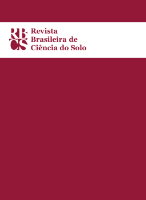
REVISTA BRASILEIRA DE CIENCIA DO SOLO
Exploring Innovations in Soil Science and CultivationREVISTA BRASILEIRA DE CIENCIA DO SOLO, published by the SOC BRASILEIRA DE CIENCIA DO SOLO, serves as a vital open-access platform for disseminating impactful research in the fields of Agronomy and Soil Science. With an ISSN of 0100-0683 and an E-ISSN of 1806-9657, this journal has been fostering academic dialogue since 2003 and has gained recognition as a Q2 journal in both Agronomy and Soil Science as of 2023. Based in Brazil and actively supporting scientists and practitioners globally, it is uniquely positioned to address the challenges and innovations in soil management and cultivation practices. The journal's Scopus rankings reflect its commitment to quality, standing at #164/406 in Agronomy and Crop Science and #74/159 in Soil Science, placing it in the top quartile of its category. Researchers, professionals, and students are encouraged to contribute their findings and insights, making it a significant resource for anyone interested in advancing the science of soil and crop stewardship.
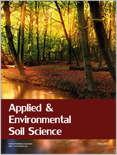
Applied and Environmental Soil Science
Exploring innovative pathways to enhance soil management practices.Applied and Environmental Soil Science, an esteemed journal published by HINDAWI LTD, focuses on disseminating high-quality research in the fields of soil science and environmental applications. With an ISSN of 1687-7667 and an E-ISSN of 1687-7675, this open-access journal has been a vital resource for the academic community since its inception in 2009. As of 2023, it holds a commendable position in the Q2 category for both Earth-Surface Processes and Soil Science, highlighting its impact in these crucial disciplines. The journal’s rankings further affirm its significance within the field, being placed 61st in Earth and Planetary Sciences and 58th in Agricultural and Biological Sciences. Researchers and practitioners alike benefit from the collaborative platform it offers for sharing innovative studies essential for sustainable soil management and environmental integrity. With a focus on advancing knowledge and fostering interdisciplinary dialogue, Applied and Environmental Soil Science stands as a crucial pillar for scholars and professionals dedicated to addressing the pressing challenges of soil and environmental health.
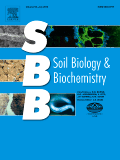
SOIL BIOLOGY & BIOCHEMISTRY
Elevating Soil Science to New HeightsSOIL BIOLOGY & BIOCHEMISTRY, published by Pergamon-Elsevier Science Ltd, is a premier academic journal that plays a pivotal role in advancing the fields of microbiology and soil science. Established in 1969, this esteemed journal has gained recognition for its rigorous publication standards and impactful research contributions, evidenced by its prestigious Q1 rankings in both Microbiology and Soil Science categories for 2023. With an impressive Scopus rank of #3 among 159 in Agricultural and Biological Sciences and #14 among 182 in Immunology and Microbiology, it boasts a notable 98th percentile in its field. The journal offers researchers, professionals, and students a vital platform for sharing innovative studies and insights about soil ecosystems and their biochemical processes, fostering greater understanding and collaboration within the scientific community. While Open Access options are currently not available, the journal remains a cornerstone for those seeking to deepen their knowledge and contribute significantly to soil biology and biochemistry.

BIOLOGY AND FERTILITY OF SOILS
Innovating Agricultural Practices Through Soil InsightsBIOLOGY AND FERTILITY OF SOILS, published by Springer, is a leading international journal dedicated to advancing the field of soil science with a focus on the intersection of biological processes and fertility management. With its ISSN 0178-2762 and E-ISSN 1432-0789, this journal serves as a key resource for researchers and professionals alike, reflecting its esteemed status in the community, evidenced by its Q1 rankings in Agronomy and Crop Science, Microbiology, and Soil Science. Covering a broad range of topics from soil health to sustainable agricultural practices, the journal's significant impact factor underscores its critical role in driving innovative research in the domain. While not offering Open Access options, it features rigorous peer-reviewed research that spans decades, converging influential studies from 1985 to 2024. Located in Germany with offices in the United States, the journal maintains a strong international presence, providing insights that enhance the understanding and management of soil ecosystems crucial for sustainable agriculture. Researchers aiming to expand their knowledge on soil biology and fertility will find this journal an invaluable asset.
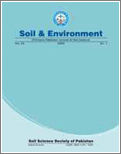
Soil & Environment
Advancing Sustainable Practices for a Healthier PlanetSoil & Environment is a distinguished open access journal published by the University of Agriculture, Institute of Soil & Environmental Sciences, located in Faisalabad, Pakistan. Established in 2006, this journal has become a vital platform for disseminating pioneering research in the fields of Environmental Science and Soil Science. With an ISSN of 2074-9546, it provides a wealth of knowledge through accessible academic articles, particularly focusing on sustainable practices and innovations that impact soil and environmental health. Although currently categorized in Q4 within both Environmental Science (miscellaneous) and Soil Science, the journal is dedicated to enhancing its influence and visibility as it progresses towards convergence years that span from 2010 to 2024. Researchers, professionals, and students will find Soil & Environment an essential resource for staying informed about the latest developments and methodologies in soil conservation and environmental sustainability. By offering publicly accessible content, the journal aims to foster greater collaboration and knowledge-sharing within the global scientific community.

Frontiers in Soil Science
Transforming soil science through collaboration.Frontiers in Soil Science, published by FRONTIERS MEDIA SA in Switzerland, is an esteemed open-access journal dedicated to advancing our understanding of soil systems and their vital role in ecosystem functioning and sustainable agricultural practices. Since its inception in 2021, this journal has quickly established itself within the scientific community, boasting a 2023 Scopus Q2 ranking in Soil Science and a notable percentile of 41 among its peers. Researchers and practitioners in the field will find a wide array of original research, reviews, and contributions that address key topics such as soil health, carbon sequestration, and nutrient cycling. With a commitment to fostering collaboration and dissemination of knowledge, Frontiers in Soil Science serves as a vital resource for professionals, researchers, and students who aspire to innovate and lead in soil science research.